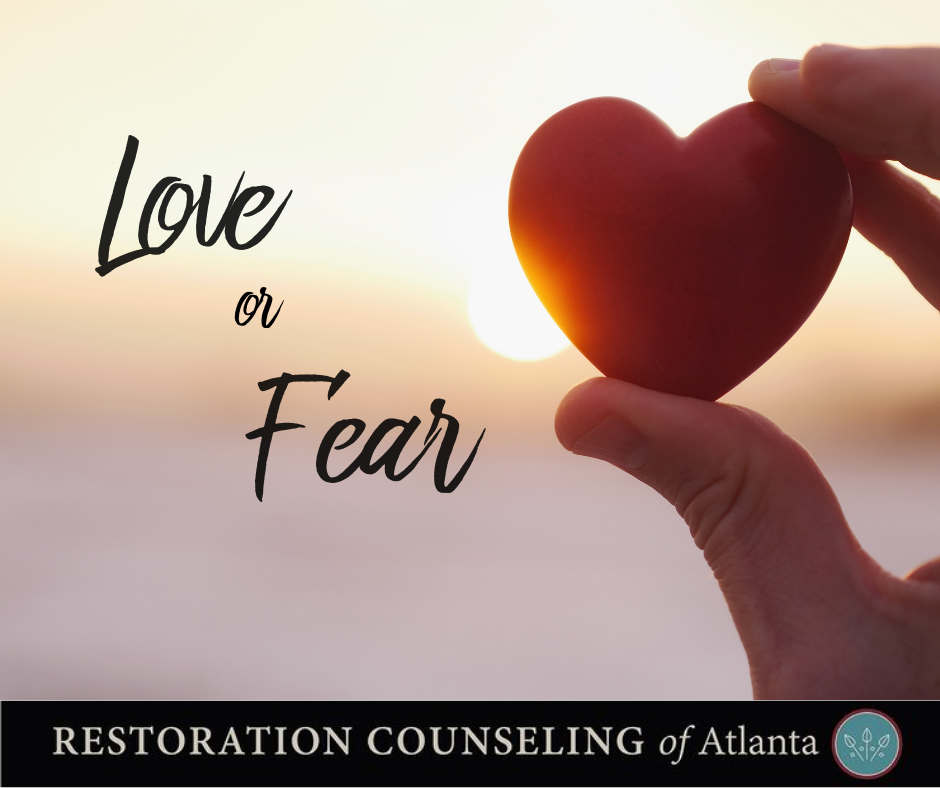Eternity in Hell?
Individuals navigating sexual and/or gender identity concerns often sit in my office. They may say something along the lines of, “I am gay or trans, and my parents are Christians. They think I am going to hell because I am gay and/or trans. I do not understand how a loving God could send someone to hell eternally for being gay or trans? So, I am not a Christian.”
When a client shares this, I usually have two consecutive thoughts:
- The person who insinuated my client is going to hell because they are gay or trans is probably scared their LGBTQ+ loved one is going to burn in hell for eternity, and they project their fear onto their LGBTQ+ loved one.
- If God is love (1 John 4:16) and there is no fear in love (1 John 4:18), hell does not need to be a motivator for influencing someone’s faith and their sexual and/or gender identity because God’s love is so much greater than the fear of hell (John 3:16).
Different Views of the Same Situation
The Water Bottle
During a session when a client shares they keep hitting a wall in a relational conflict, or when a couple communicates, but they do not understand what their partner is saying, I will sometimes hold up my water bottle and ask each person in the room to describe the water bottle. Without fail, each person describes the water bottle completely differently.
My water bottle is a clear, plastic, wide-mouth, bright green Nalgene water bottle that holds approximately 32oz of liquid. It is also BPA free and made in the USA from 50% plastic waste which offsets the use of fossil fuels and lowers greenhouse gas emissions. If I use my Nalgene water bottle for an entire year, it will be equivalent to saving 167 plastic water bottles from landfills.
These descriptors vary in observation and knowledge, and depending on the person, each person might describe the water bottle differently because of who they are and what they know. The water bottle highlights how individuals think and view things differently. This occurs in all areas of life; every person has a unique way of viewing and engaging with the world. Conflicts arise when two or more people are unable to hear the other person’s perspective and facilitate a conversation that validates and honors both persons.
Because it can be hard to navigate conversations, especially when discussing the intersectionality of faith and various aspects of life, I would like to offer a framework that can be helpful when having these conversations. For the purpose of this article, this perspective is specifically catered to faith and LGBTQ+ concerns though this framework can be applied to other topics.
Frameworks for Conceptualizing LGBTQ+ Concerns within a Faith Context
- Integrity Lens: Gender incongruence or same-sex attraction is confusing the sacredness of maleness and femaleness and specific resolutions as violations of that integrity.
- Disability Lens: Gender incongruence or same-same-sex attraction as a reflection of a fallen world in which the condition is a disability, a nonmoral reality to be addressed with compassion.
- Diversity Lens: Gender incongruence or same-sex attraction reflects an identity and a culture to be celebrated as an expression of diversity.
Discussion Questions
- Which lens do you primarily see yourself in?
- How did you come to see yourself primarily through this lens?
- What are the strengths of each lens?
- Imagine these lenses as a Venn diagram. Can you integrate different parts of the other lenses into your perspective?
How You Can Help
It can be scary to learn your loved one is LGBTQ+ because this community often suffers significant abuse in society and typically experiences greater mental health challenges. Moreover, as a Christian, if a core belief is that being gay and/or trans is a sin, this can illicit fear in the hearts and minds of the LGBTQ+ individual and their family. Especially, if the family’s theological perspective is that deliberately living into sin results in spending eternity in hell.
You may be tempted to allow your own fear of an LGBTQ+ loved one experiencing eternal suffering to influence your conversation with them. But I invite you to pause – take a step back and listen. Learn.
Talk with them about the three lenses: integrity, disability, and diversity. Learn about how they view their relationship with God and engage with Scripture as an LGBTQ+ person. Explore the strengths of each lens. Ask questions and engage with them in conversation in hopes that having a discussion will lead to more understanding and connection versus judgment and a bad taste in their mouth about God.
Love, Not Fear
I pray your conversations reflect the love of Christ as he is patient and kind. He does not envy or boast, and he is not arrogant or rude. God is not irritable or resentful; he does not rejoice in wrongdoing. He bears all things, believes all things, hopes all things, and endures all things.
Please feel free to schedule a consultation or session to discuss further using the three lenses to navigate conversations on the intersectionality of faith and LGBTQ+ concerns.
More on the three lenses:
Yarhouse, M. (2015), A Christian perspective on gender dysphoria, Understanding Gender Dysphoria: Navigating Transgender Issues in a Changing Culture (Chapter 2). Downers Grove, IL: InterVarsity Press.
Q Christian. LGBTQ+ theology 101. https://www.qchristian.org/resources/theology#theologies
Understanding hell beyond eternal damnation in a fiery lake:
Keller, T. (2008), How can a loving God send people to hell? The Reason for God: Belief in the Age of Skepticism (Chapter 5). New York, New York: Penguin Group.
Lewis, C.S. (1946), The Great Divorce. New York, New York: HarperCollins.
 Written by Ashley Lewis MA, APC
Written by Ashley Lewis MA, APC
Woodstock and Roswell
ashleylewis@restorationcounselingatl.com
Ashley works with adolescents and adults from all backgrounds and provides marriage and premarital counseling. Areas of focus include depression, anxiety, sexual and gender identity concerns, trauma, adoption, anger, and grief.

